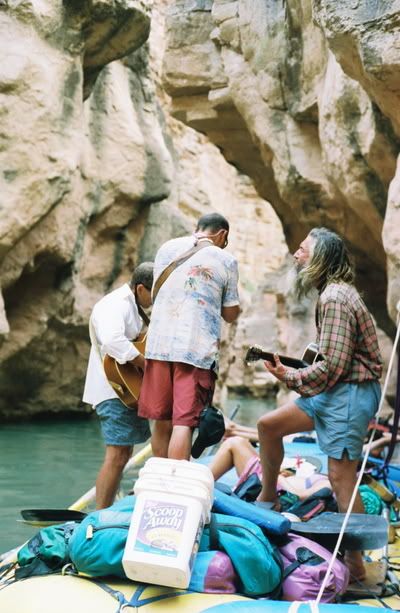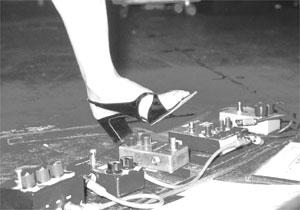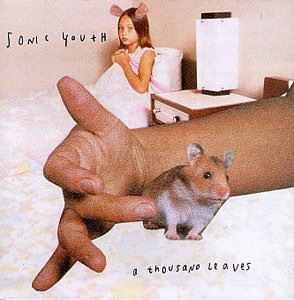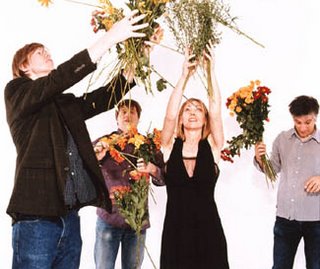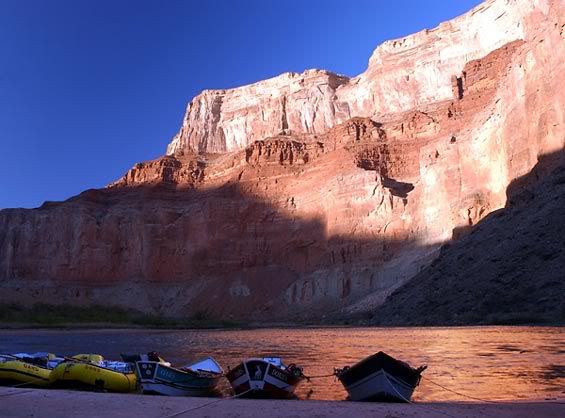Canyon hear me running
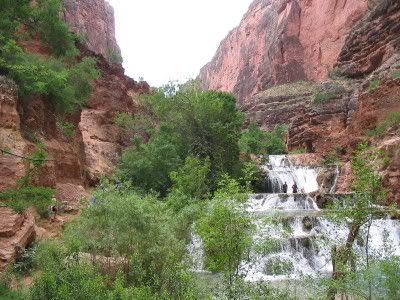
by Ryland Walker Knight
We’ve decided it’s time to descend. It’s four miles back to the boats and coming up took two hours. We’re leaving Beaver Falls’ turquoise waters and otherworldly travertine dams to return to the mighty Colorado’s muddy brown thunderous flow.
It’s midday now, somewhere around 1 or 2, and the sun is killing me. I start inching away from the pool while the others gather their hats and shoes and trash. Allison and Ethan catch up first and we’re alone, ahead of the teenagers. I’m baking but taking my time with the narrow path. I can’t see the ground because of all the long grass, mesquite and prickly vines arching over our feet. The sun is a killer, I’m sure. Why didn’t I jump into the pool once again?
“Hey, Ryland, why don’t we pick up the pace?” Allison asks from behind me.
I quicken my steps, deciding my shins and ankles will be thrashed no matter how fast I’m walking. Ethan starts singing “Twist and Shout”. Allison joins in. They’re trading off lines and I’m peeling away. They didn’t pick up any pace. I keep going faster. Their singing is more distant and I start running. I’m covered in sweat immediately. Allison says, “Hey!” and I hear her start to run up behind me. “Hey be careful.”
I’m running full speed now: jumping over the big clumps, leaping from rock to rock, big steps on the straightaways, little steps down rocks. Allison is close behind and Ethan just a step off her. We’re at water again—a crossing—thank God. I plunge through the current, a million little rocks swimming in my flip flops. At the other bank I pause to shake out the remaining pebbles and I’m off again, this time into the shade—praise Him.
There’s branches on this side. Branches we have to duck under or swat aside or simply power through eyes closed. I hope I’m far enough ahead so I won’t thwack Allison and luckily I am. I keep jumping off the trail to avoid fallen limbs and gross overgrowth only to be forced back on the crowded trail by an impassable stretch up an embankment or across slick mud. Soon we’ve run to the next crossing.
“You think we’ll pass Don?” Ethan yells from behind. Don had started back before us with Beth by about twenty minutes.
“Probably, at this rate,” Allison says.
I don’t say anything but I’m thinking, “If Don can run up this canyon why the hell can’t we run down it?” This new side of the river is full of rocks but somehow I’m skipping, leaping, timing my steps to hit the peaks or flattops ready to spring ahead, up or down. In five minutes of bobbing and weaving we’re right behind Beth. Beth is cautious, tired, slow. There’s no way around her yet. We’re stuck walking for another five minutes until the next crossing, in the sun.
Don wades out to the middle of the river and floats downstream. Allison follows him. Ethan and I lead Beth across briefly before sprinting ahead to slip into the flow and trudge through mud into the current where we plow our way to the rocks again. Don is waving us ahead. Allison says, “You’re too slow, old man,” and I try not to giggle. I’m sure he’d kick our butts in a race.
This first part involves a little hugging. We hold the underside of a shelf and shuffle along the two-inch wide ledge below. I go the slowest, naturally--all worries--until I hit a little dirt and then I’m running again. We’re more open now, the plants only grow to my knees here, not my shoulders, and it’s pretty easy to jump around. I’m flying downhill and Ethan’s on my heels. I throw myself through a branch and yell back, “I don’t really know why I’m doing this.” We’re turning a corner into more shade and I stop running.
Allison and Ethan catch up while I drink some from my Nalgene bottle. There’s maybe five ounces left so I only drink two. Ethan’s holding up his gallon jug and water spills out the sides onto his bare chest. Allison’s bottle is empty. “Let’s go,” I say. “He’s off,” she says. “That was quick.”
Back in the sun, back on the move. But the sun’s not as hot now. Maybe the angle changed. Getting tired. My foot slips across a rock and Allison shrieks but I catch myself and keep running—everything’s fine. My balance is getting worse, though, I can tell, and I slow it down a bit. Jim Doolittle is wading in the river (he’s so huge!) and not on the trail—we’re gone, past him. We’re almost back, I think. The sweat that covered my body’s almost gone. One more sprint uphill. Fuck, that took it out of me.
Walking in the shade is easier. Pretty soon we’re at that hole in the rock where we climb down a fallen tree that has footstep grooves cut into it. At the bottom of the short cave there’s a large shallow pool off the river. Allison and Ethan run past me and dive into it. I walk to the edge, whine “Oh fuck” all smiles and fall face first into the water. When I surface they’re smiling and we swim to the other side. The current floats us a quarter mile and cools us off before we have to hit the trail again for the last descent across rocks to the final emptying into the Colorado.
The last stretch of Havasu is darker green, in the shade of sheer, curved pink rock walls that bend just enough for us to see Jimbo playing his guitar on one of our rafts. We’re swimming again. The orange peels in my pocket float out and into my face. I pretend to eat them but spit them out. I can barely doggy paddle; it’s easier to swim freestyle. Ethan’s at the boats, climbing, looking for his camera. Allison’s right behind him, onto her boat up the side. I’m resting on my back in the river, listening.
Jimbo plays a version of Marvin Gaye’s “How Sweet It Is (To Be Loved By You)” where that’s all he sings in his plaintive, scratchy, bruised voice (“How sweet it is ... to be Loved by you ...”) over and over and over again. Louis accompanies with some acoustic slide and Gab rounds out the trio with his blues harmonica.
How sweet it is to be LOVED by you.
I open my eyes and see I’ve bobbed my way next to them where I stand up in the waist-high water. I smile at Jimbo and he smiles back, still singing, because he knows it’s my favorite song to hear on the river. Allison offers to pull me onto the boat but I’m able to haul myself over the tube and onto the front deck. I lay across the opposite tube with my head on an envelope bag tied next to our dry box with my eyes closed.
How sweet it is to be LOVED by you.
The band keeps playing and Jimbo keeps singing. Allison opens my ammo box and retrieves my camera: she’s taking pictures. She wants me to look at her. I turn my head but won’t open my eyes. I just want to soak this. Nobody’s speaking yet and this weight of fatigue and wet clothes on the hot plastic boat is the harmony I’d hoped for all trip.
How sweet it is to be LOVED by you.
I open my eyes and there’s the camera: in my face: click. Allison laughs. My heart slows down again. Where's camp tonight?
How sweet it is to be LOVED by you.